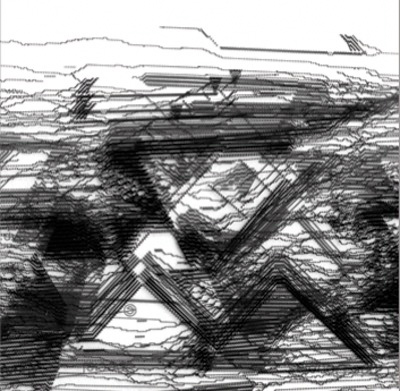As weird as this may sound, the music on these two tape-released albums by Chris Douglas, better known as Dalglish, positively aches, particularly Bardachd. It shouldn’t be a surprise, really, because Douglas’ 2011 album as Dalglish, the well-received Benacah Drann Deachd, was traversed with oblique references to time, language (specifically the Gaelic of the album’s title) and memory, suggesting that Douglas prioritised exploration of emotion and atmosphere over the driving rhythmic pulsations at the centre of most modern electronic and techno music.
The twelve tracks that make up Bardachd are descended loosely from the ambient tradition of Brian Eno and Cluster, but they’re – if that’s even possible – even more minimal. Synths are not so much played as caressed, with hesitant half-melodies emerging via loops and occasional muffled beats like nocturnal animals into the daylight. Such a delicate, subdued approach immediately brings to mind German sound artist Thomas Koner. Like Koner, Douglas’ music seems to act as a mirror image of bleak, snow-blighted landscapes, except that in Scald Rougish’s case, it’s as if the music is not just a reflection of cold terrain, but also the contents of its composer’s heart. I can think of few albums released recently that so strongly evoke the image of a man standing on a clifftop contemplating the elements. Bardachd could almost be the soundtrack to Nuri Bilge Ceylan’s Distant.
Communicating with me via e-mail, Douglas explained that Bardachd is Gaelic for poetry, and that the album can be seen as a reflection of the troubled relationship he was going through with his then-girlfriend, a poet, during the album’s composition in 2001. This context rapidly makes the album much more involving and arresting than its restrained make-up of subtly multi-layered drones and sequencer patterns initially might suggest. There is a sense that these tracks are all segments of a single tune, and some may find it samey (like a lot of ambient music, it tends to drift into the background), but if you allow yourself, much like Eno’s Music for Airports, to immerse yourself into these sparse, fraught sonic vignettes, the results are truly affecting. That Douglas is able to invest such feeling in his music when armed with such minimal tools (one synth, one sequencer, a delay pedal and a tape recorder) is testament to the sincerity of what he’s trying to do in Scald Rougish. It’s a shame that it would appear to have garnered much less attention than Dalglish.
In comparison to Bardachd, the more recently-recorded tracks on Auen Ansici are much busier and aggressive beasts, akin to Douglas’ recent(ish) concert as Dalglish at London’s Vortex in terms of propulsive potency. Dense, abrasive crackle shuffles fitfully over melodies that share the despondent nature of Bardachd‘s but are often subsumed by near-industrial levels of digital percussion, angry sound effects and sudden, hiccuping organ tones. Auen Ansici acts almost as a reaction to Bardachd‘s pleasant gloom, a sort of angry retort to that album’s deflated beauty. Even during its most relaxed moments, a sense of imminent disturbance bubbles away under the melodies, as if waiting to burst into hissing noise. In some ways, Auen Ansici sees Chris Douglas edging towards the chilly sound of minimal techno, except that his very human – humane? – sensitivity always pierces through the ice, removing any sense of predictability, groove or momentum, almost as if sabotaging his own work. Ultimately, it’s a less successful, more taxing listen than Bardachd, but it still lays bare the beating heart of its creator in ways that few electronic composers seem to dare imagine.


